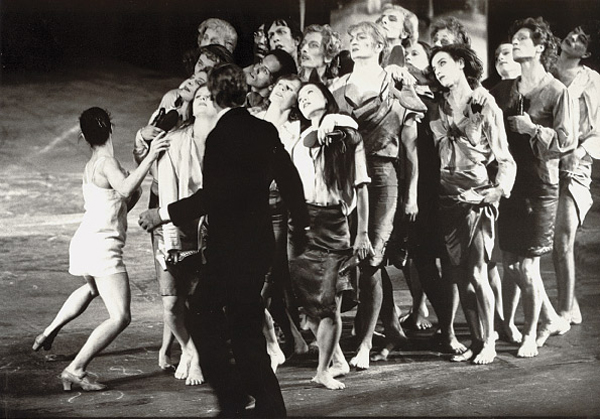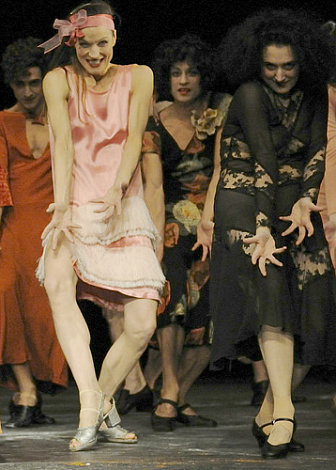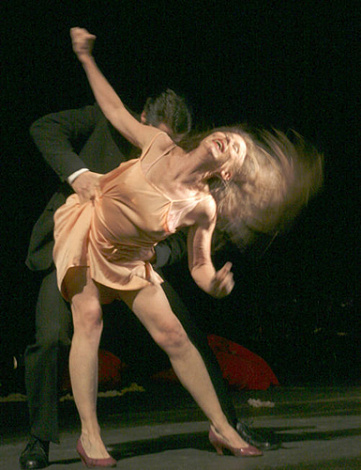“HAVE NO FEAR” Created by Pina Bausch
With songs from
“Dreigroschenoper”, “Kleine Dreigroschenmusic”, “Happy end”, “Das Berliner Requiem” and “Aufsteieg und Fall der Stadt Mahagonny”
Performers
Marcus Bluhm, Melissa Madden Gray, Mechthild Grossmann, Karin Rasenack, Regina Adventoablo Aran Gimeno, Rainer Behr, Andrey Berezin, Damiano Ottavio Bigi, Ales Cucek, Clementine Deluy, Josephine Ann Endicott, Silvia Farias Heredia, Barbara Kaufmann, Ditta Miranda Jasjfi, Nayoung Kim, Daphnis Kokkinos, Eddie Martinez, Thusnelda Mercy, Pascal Merighi, Cristiana Morganti, Morena Nascimento, Nazareth Panadero, Helena Pikon, Jorge Puerta Armenta, Franko Schmidt, Azusa Seyama, Julie ABallet-mastenne Stanzak, Michael Strecker, Fernando Suels Mendoza, Aida Vainieri, Anna Wehsarg, Tsai Chin Yu
Rehearsal Assistants
Matthias Burkert, Robert Sturm
Assistant to Director
Felicitas Willems
Technical Director
Jorg Ramershoven
Light Designer
Fernando Jacon
Assistants to Light Designer
Jo Verlei, Kerstin Hardt
Sound
Andreas Eisenschneider, Karsten Fischer
Stage Technicians
Diettrich Roder, Martin Winterscheidt
Administrator
Grigori Chakhov
Shiatsu therapeutist
Ludger Muller
TANTHEATER WUPPERTAL PINA BAUSCH
Kunstlerische Leiterin des Tanztheaters
Pina Bausch
Geschaftsfuhrerin
Cornelia Albrecht
Musikalische Mitarbeit
Matthias Burkert, Andreas Eisenschneider
Assistent Pina Bausch und Mitarbeit Proben
Robert Sturm
Assistentin und Mitarbeit Proben
Josephine Ann Endicott
Mitarbeit Proben
Benedicte Billiet, Matthias Burkert, Marion Cito, Barbara Kaufmann, Daphnis Kokkinos, Dominique Mercy, Helena Pikon, Hans Pop
Trainingsleiter (a.G.)
Christine Biedermann, Ernesta Corvino, Andrei Klemm, Ed Kortlandt, Christine Kono, Paul Melis, Agnes Pallai, Janet Panetta, Antony Rizzi
Personliche Referentin von Pina Bausch
Sabine Hesseling
Assistent von Pina Bausch
Marc Wagenbach
Assistentin der Geschaftsfuhrung
Katharina Bauer
Organisation und Mitarbeit
Grigori Chakhov, Claudia Irman, Ursula Popp
Inspizienz
Peter Lutke, Felicitas Willems
Videoarchiv
Grigori Chakhov
Mitarbeit Foto/Video
Ulli Weiss (a.G.)/Foto; Jerome Cassou (a.G) /Video
Technische Leitung
Manfred Marczewski, Jorg Ramershoven
Leiter der Beleuchtung
Fernando Jacon
Ton
Andreas Eisenschneider, Karsten Fischer
Requisite und Merchandising
Jan Szito
Garderobe
Harald Boll, Silvia Franco, Andreas Maier, Katrin Moos, Ulrike Wusten
Shiatsu Therapeut
Ludger Muller
With support of Goethe Institute in Moscow
The Dance Session is strictly speaking not the session of dance. Pina Bausch and her dance company have come up with the most destructive show one could have ever imagined to see on the German stage. It goes without saying they are doing this quite consciously. This show is not only absolutely unpretentious in terms of scale or humor. It totally lacks any outward luster. This performance is poor, infinitely sad and yet charged with enormous energy… In contrast with Brecht who spoke about seven mortal sins, Pina Bausch focuses on one – renting out female flesh. It is by no means limited to the all too old theme of a woman’s degradation to a sellable pleasure article that can be obtained through fluttery or by force. Neither has it anything to do with emancipation. With quite masochistic devotion the choreographer revels in the meanness of the world and the baseness of the relationships therein. Hence the depressingly sordid eroticism that culminates in the undisguised drag show.
Die Welt, June 18, 1976
The performance, lasting seventy-five minutes, is recklessly balancing between ballet and circus. Significantly, the choreographer demonstrates extraordinary sense of proportion between tears and laughter, providing perfect satisfaction for rapturous audiences looking for fun and entertainment and at the same time not losing a single bit of its profundity. The charming details, most meticulously worked through and perfectly calculated, are blended together to achieve amazing integrity. Pina Bausch vehemently scoffs at the world that men have built for themselves and for the women dependent on them.
Frankfurter Allgemeine Zeitung, July 1, 1976
With her production of The Seven Mortal Sins Pina Bausch accomplished a real coup-de-theatre and effectively reached out for the new horizons. The Seven Mortal Sins, the only ballet performed to the songs by Berthold Brecht and Kurt Weill, was premiered in Paris in 1933 and for thirty-two years now has been the ‘trademark’ of the Wuppertal legend.
NRZ Essen, December 1, 2008
The disciple of the celebrated expressionists Kurt Jooss who in his turn once studied with great reformer and philosopher of dance Laban, Pina Bausch joined the ‘high class’ of the arts, which largely accounts for her intellectual and aesthetic graciousness so naturally combined with aesthetic extremism and unparalleled creative freedom.
Vadim Gayevsky



